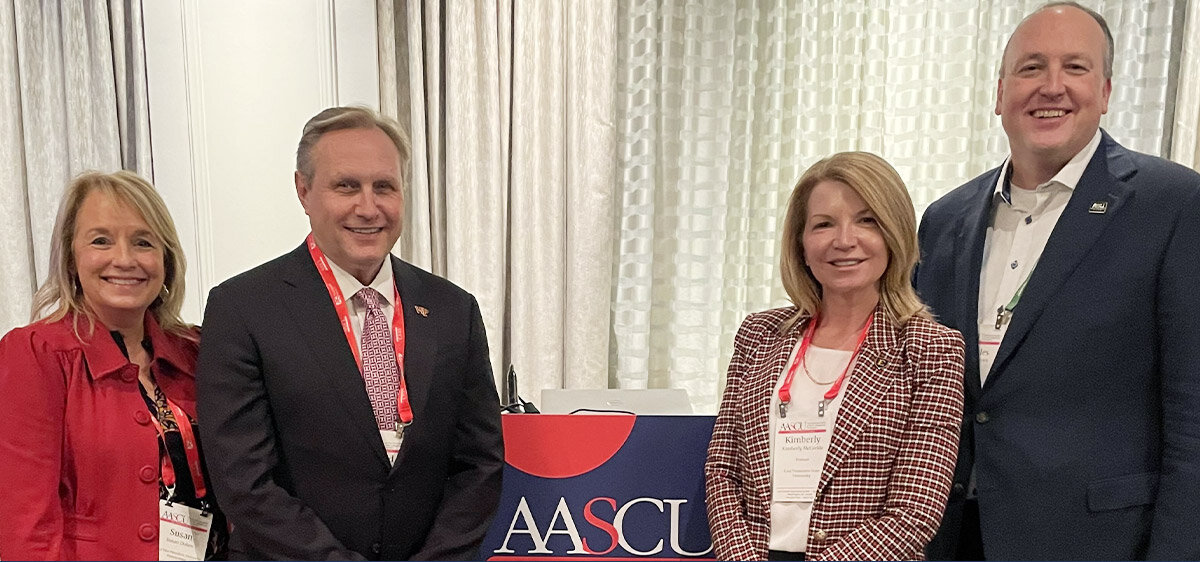Understanding the value of a public-private partnership and the support such a collaboration can offer was the central topic of a panel discussion among regional university leaders at the American Association of State Colleges and Universities (AASCU) Annual Conference, held in Chicago, Ill., November 4-7.
The concurrent session on Nov. 6 featured Dr. Charles L. Welch, President of the Arkansas State University System; Dr. Kimberly D. McCorkle, Provost and Senior Vice President for Academic Affairs at East Tennessee State University; and Dr. Richard J. Helldobler, President of William Paterson University.
The institutions they represent are AASCU members and partners with Academic Partnerships (AP). The discussion was moderated by AP’s Senior Vice President, University Partnerships, Susan Dukes.
Clearly Defining Partnership Roles
During the session, Standing Together, Achieving More: Regional Universities Overcoming Challenges and Expanding Their Impact Through a Public-Private Partnership, the group expounded on the importance of building stakeholder buy-in for public-private partnerships under consideration from the very start.
In sharing Arkansas State University’s success in working with AP since 2008 and building on internal support for expanding an online portfolio now including more than 130 programs, Dr. Welch said, “There is not a special recipe, but allow time, and more importantly, fully define the relationship—what it is, and more importantly, what it isn’t.”
He explained, “Everyone should understand that [with this partnership] we are not trying to attract the 18-year-old student. We are not trying to cannibalize traditional programs or populations but trying to reach those students we have historically not been able to attract — while giving us the opportunity to scale and the extra expertise that we could not do on our own. And this actually lets us strengthen the academic quality by allowing our faculty and staff to focus solely on the academic piece while AP does their piece.”
Focusing on Nontraditional and Underserved Students
The panelists were united in stressing the need to deliver online learning geared to the student’s needs, with the conversation focused on helping nontraditional and underserved students succeed. They weighed shrinking budgets and the contraction of traditional undergraduate audiences against the larger numbers of adults without a degree or advanced degree, seeing the latter as an untapped resource and expansion of their institution’s mission.
“We see the opportunity to add diversity through expanding the number of programs that we offer through the AP partnership,” said Dr. McCorkle. “We’re in a relatively rural part of the state of Tennessee, and we are somewhat level in diversity in terms of enrollment. If we expand our opportunities to reach more students through master’s programs that are available for working professionals, we see that this is really aligned with our university’s mission, and we’re excited about that possibility.”
Re-imagining the Model
While the breadth of the panelists’ experience in partnering with AP varies from a handful of years and programs to more than 15 years and 130+ programs, all three agreed that succeeding in a partnership designed to help institutions offer accelerated online programs for nontraditional audiences requires rethinking the model.
They said that this means changing habits engrained within a 15- or 16-week semester, acclimating service departments across the university to a new cadence of 6-, 7-, or 8-week courses and multiple starts, streamlining admission processes, and increasing availability and responsiveness for student advising and support services delivered remotely.
While these changes apply to graduate programs, panelists concurred that they apply even more to online programs in the undergraduate space.
“We have to serve these students in meaningful ways that don’t fit the traditional model,” said Dr. Helldobler, noting that, “We are so engrained in the 15-week model. But once you achieve success (with accelerated online degrees), it can take off quickly.”
“What we’ve found is the average age of [our undergraduate] cohort is 36, predominantly women of color, and predominantly parents. I spent a virtual hour with some of these students, a very impactful conversation, hearing them say that they thought college was off the table for them, how they didn’t think there was a workable or affordable degree model for them until they found online.”
“I think about the impact of these students on the next generation and the social fabric, and it’s what I believe in as a higher education leader in terms of access and affordability.”
In summary, the panelists shared a common sentiment: This type of public-private partnership is working to serve a population that universities can’t necessarily reach on their own. It’s changing the delivery mode of education so that it is both affordable and accessible for students, sustainable by the school, and supportive of community growth.
For more information on public-private partnerships and AP’s flexible models, contact us today.
About Academic Partnerships
Academic Partnerships (AP) assists primarily regional public universities in increasing their access and impact by making their academic programs available to students online. Founded in 2007, AP’s mission is to expand access to high-quality, affordable, and workforce-relevant education, especially for working and adult students. AP brings single-minded dedication to student success, an integrated set of services, and data-driven performance to our collaboration with university partners. For more information on innovative online learning solutions, please visit www.academicpartnerships.com.
